Technology-savvy entrepreneurs from Taiwan help not only strengthen Taiwan’s economic power with their endeavors, but also flank the nation’s diplomatic thrust and enhance the reservoir of sympathies for it.
The recently held Concordia Summit 2022 in New York, with the participation of many high-profiled international figures from politics to finance, culture to environmental protection and human rights, was attended by a number of Taiwanese officials and businesspeople. Indeed, the summit, timed to coincide with the UN General Assembly, is being touted as a “mini United Nations.”
Taiwan’s uncontested global leadership in the electronics field, particularly in chip manufacturing, was noted at the summit where President Tsai, Ing-wen (蔡英文), in a recorded message, thanked organizers for staging the summit, and discussed Taiwan’s development.
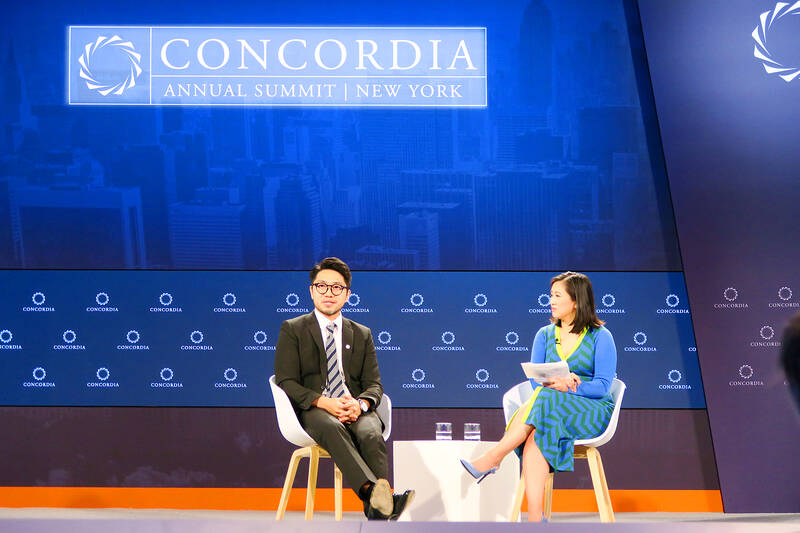
Photo: CNA
A striking feature about Tsai’s virtual presence was that she was listed as President of the Republic of China (Taiwan), in contrast to certain UN-affiliated organizations, which usually describe Taiwan as “Chinese Taipei.”
HUMANITARIAN AID
Alex Shyy (史立軍), Deputy Secretary General of Taiwan’s International Cooperation and Development Fund (ICDF), said that Taiwan provides a wide range of technological assistance to developing countries, though “it is driven mainly by humanitarian considerations.”
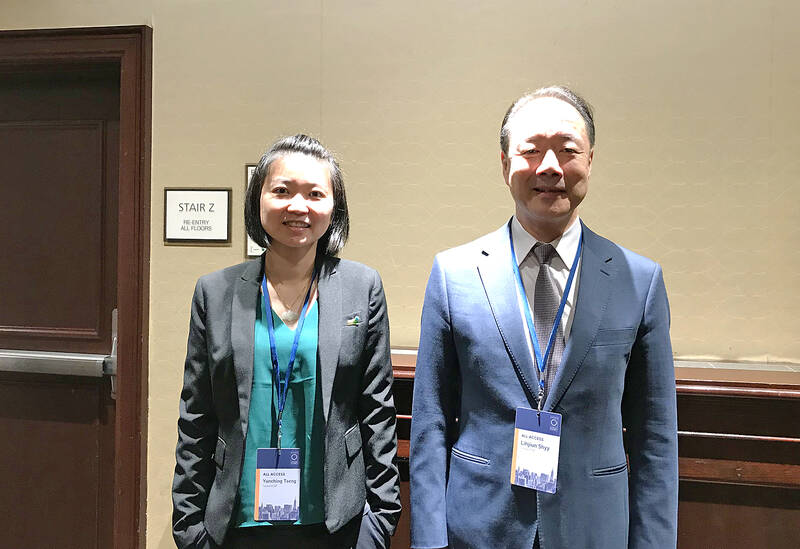
Photo: Manik Mehta
“We provide soft loans, technology, education, vocational training, humanitarian aid … these are the key elements of our aid program,” he told the Taipei Times.
Extending such assistance poses a sharp contrast to China’s commercial loans for projects in developing countries that get caught in Beijing’s debt trap and end up mortgaging their strategic assets as a surety for their inability to repay the loans, which recently happened in Sri Lanka.
The ICDF is active in Central and South America, the Caribbean and Pacific islands, Southeast Asia and West Asia Africa. This form of assistance is welcomed by many countries that are known to have disappointing experiences with China.
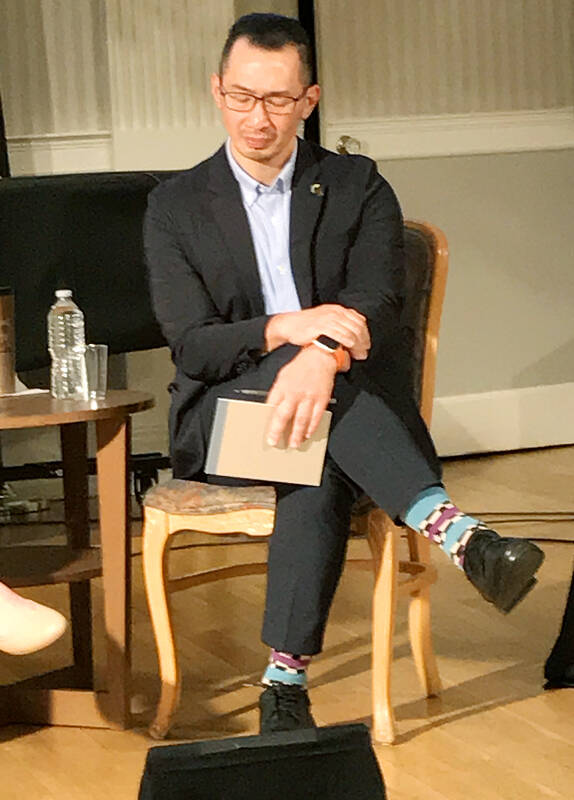
Photo: Manik Mehta
Shyy said that ICDF works closely with the European Bank for Reconstruction and Development and provides special funds to it to implement projects in Romania, Bulgaria, Uzbekistan and Moldovia.
“Our loans are given at very low interest rates as per OECD regulations. We have strategic partnership with USAID. We are here at the Concordia Summit to create awareness about Taiwan and build partnerships with US agencies,” Shyy said.
Minister for Digital Issues Audrey Tang (唐鳳) highlighted Taiwan’s technological advancement, and its high level of innovations and sophistication. Taiwan’s techno-entrepreneurs, many of whom visited New York during the UN’s general assembly, were seen interacting with US businesspeople.
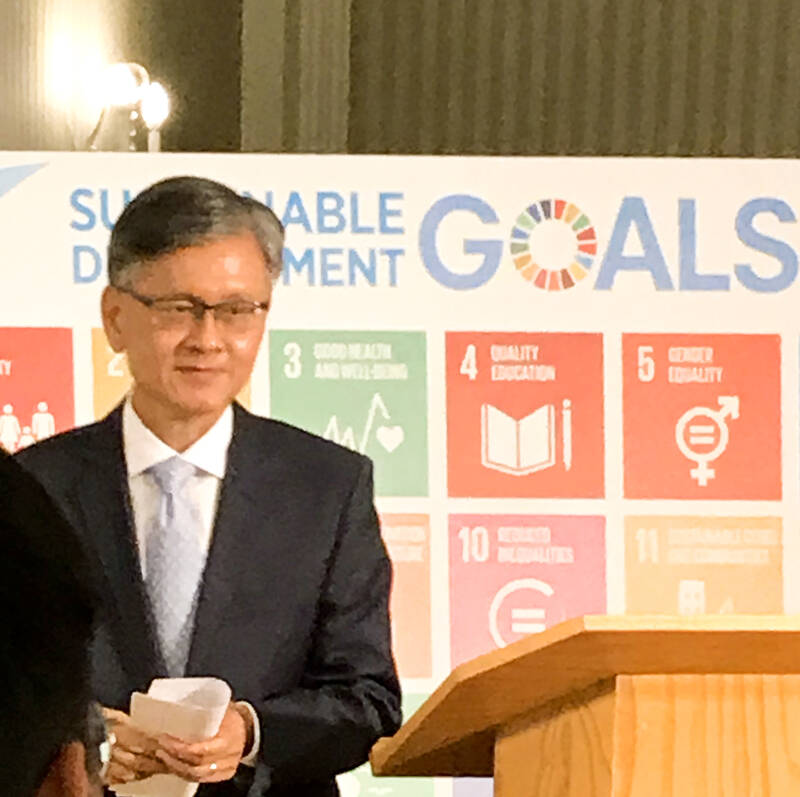
Photo: Manik Mehta
INNOVATION
Arthur Huang (黃謙智), CEO of Taipei-based Miniwiz Co, made a strong pitch for the recycling industry, whose aim is to reduce pollution and stop the depletion of resources in keeping with a key UN social development goal emphasizing conservation and engaging in responsible consumption and production.
“You can say that we convert trash into good, usable materials … [T]rash is precious and should not be wasted in the interest of our environment and our planet. I am wearing a suit that is made of used polyester propylene,” Huang said, pointing to his attire as he spoke with the Taipei Times.
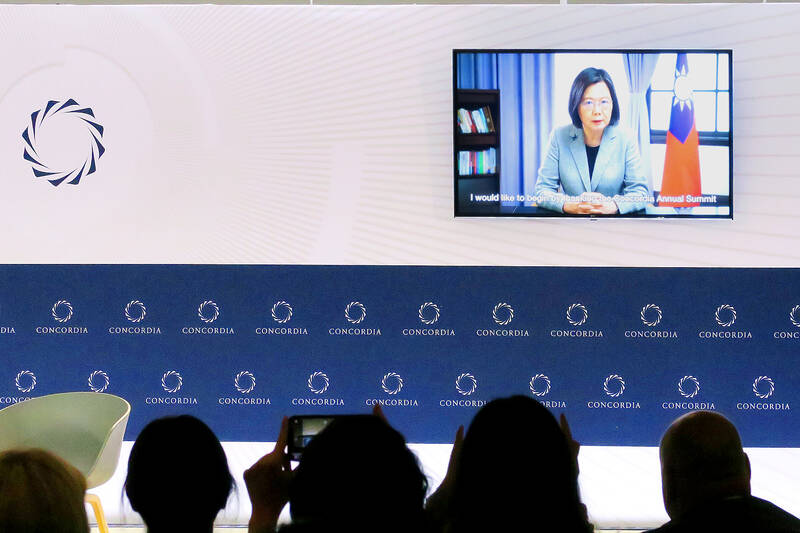
Photo: CNA
“Governments have tremendous power to play a role in the circular economy,” Huang added. “The perception of trash in the consumer mind is still negative and needs to change. The first step is to make people realize that it is possible to create things from trash,” he said.
Huang added that his company is targeting high-consumption industries such as textiles, plastics, steel and aluminum to reduce carbon emissions.
Another manifestation of the much-discussed “techno-entrerpreneurial diplomacy” was on display at another event, “Finding Transformative Solutions Through Innovative Partnership Mechanisms,” organized by the Taipei Economic and Cultural Office in New York, where a number of prominent speakers, including Minister of Foreign Affairs Joseph Wu (吳釗燮), conveyed their views by video conference.
Allen John Ku (樊亞倫), Vice President of Ever III & Partners, a Taiwan-based consulting firm focusing on the new economy, innovation and “bridging Taiwan to the world,” said his company designs and executes programs that enhance the innovation ecosystem and connect resources between regional stakeholders including startups, government agencies, multinational corporations, local businesses, adding that “our signature program” is the Taiwan Startup Stadium which helps Taiwan startups go global.
“We are the purveyors of the Startup Island Taiwan brand for the National Development Council of Taiwan,” he said.
Ku maintained that Taiwan, though officially not a UN member, was working for the realization of the UN’s 17 social development goals (SDGs), and had made good progress towards achieving the goals.
“The world has already started noticing Taiwan’s progress even though the majority of the nations have not made much progress,” Ku said.

A vaccine to fight dementia? It turns out there may already be one — shots that prevent painful shingles also appear to protect aging brains. A new study found shingles vaccination cut older adults’ risk of developing dementia over the next seven years by 20 percent. The research, published Wednesday in the journal Nature, is part of growing understanding about how many factors influence brain health as we age — and what we can do about it. “It’s a very robust finding,” said lead researcher Pascal Geldsetzer of Stanford University. And “women seem to benefit more,” important as they’re at higher risk of

Eric Finkelstein is a world record junkie. The American’s Guinness World Records include the largest flag mosaic made from table tennis balls, the longest table tennis serve and eating at the most Michelin-starred restaurants in 24 hours in New York. Many would probably share the opinion of Finkelstein’s sister when talking about his records: “You’re a lunatic.” But that’s not stopping him from his next big feat, and this time he is teaming up with his wife, Taiwanese native Jackie Cheng (鄭佳祺): visit and purchase a

April 7 to April 13 After spending over two years with the Republic of China (ROC) Army, A-Mei (阿美) boarded a ship in April 1947 bound for Taiwan. But instead of walking on board with his comrades, his roughly 5-tonne body was lifted using a cargo net. He wasn’t the only elephant; A-Lan (阿蘭) and A-Pei (阿沛) were also on board. The trio had been through hell since they’d been captured by the Japanese Army in Myanmar to transport supplies during World War II. The pachyderms were seized by the ROC New 1st Army’s 30th Division in January 1945, serving

The People’s Republic of China (PRC) last week offered us a glimpse of the violence it plans against Taiwan, with two days of blockade drills conducted around the nation and live-fire exercises not far away in the East China Sea. The PRC said it had practiced hitting “simulated targets of key ports and energy facilities.” Taiwan confirmed on Thursday that PRC Coast Guard ships were directed by the its Eastern Theater Command, meaning that they are assumed to be military assets in a confrontation. Because of this, the number of assets available to the PRC navy is far, far bigger